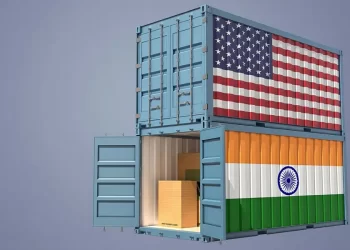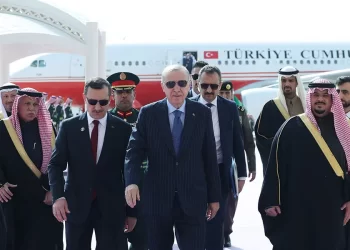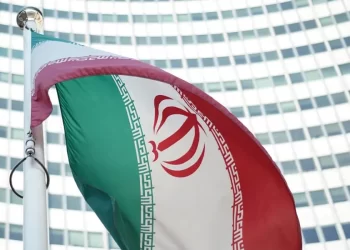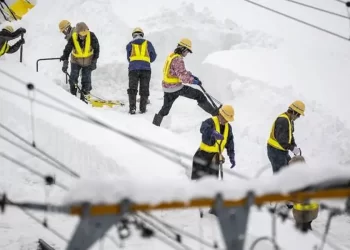JOHNS CREEK, Ga. (news agencies) — A drive out to Atlanta’s sprawling suburbs passes the cultural centers, schools and houses of worship that opened as this became the nation’s sixth-largest metropolitan area.
Displaying the diversity within the growth, shops and brightly lit billboards advertise in Chinese, Korean, Spanish and Hindi. The changes have been stark even for residents who experienced them.
“There were a handful of Indians around when I was growing up,” said Hemant Ramachandran, an Atlanta attorney who grew up in Gwinnett County, a short drive from Atlanta and the heart of Georgia’s fast-growing Asian American community.
In some parts of Gwinnett, as well as neighboring Forsyth and Fulton counties, most of the census tracts and schools are now majority Asian American, according to county and Census Bureau data.
“It’s grown a lot since I was a kid. It definitely wasn’t like there where I grew up or anywhere else in metro Atlanta,” Ramachandran added.
Vice President Kamala Harris comes to Georgia Tuesday for what aides bill as the biggest campaign rally since she became the probable Democratic nominee. The daughter of Jamaican and Indian immigrants will aim to court the votes of a region where Asian American voters — often Indian American communities in particular — stand to play a pivotal role in the election.
Harris’ identity as a woman of Indian descent has sparked kitchen-table conversations in many Asian American and immigrant households in metropolitan Atlanta and energized local advocates. For many in Atlanta’s Indian American community, Harris’ story strikes a unique chord.
“The South Asian community here is fairly excited because this is really unprecedented,” said Ashwin Ramaswami, a 24-year-old technology entrepreneur and state senate candidate for a competitive seat that spans much of Atlanta’s affluent northeastern suburbs.
Harris’ ascent comes at a moment of especially high visibility and influence for Indian Americans in politics.
Five Indian Americans serve in Congress. Usha Vance, the wife of Ohio senator and GOP vice presidential nominee JD Vance, is Indian American, as were two of the most prominent candidates in the 2024 Republican primary, Nikki Haley and Vivek Ramaswamy.
Democratic Rep. Pramila Jayapal of Washington state, who chairs the Congressional Progressive Caucus, was one of the first lawmakers Harris called for support after President Joe Biden bowed out of the race.
Indian Americans are now the largest population among Asian Americans, according to a recent US Census survey. Arizona, Georgia, Nevada and Michigan have relatively large Indian American communities that could prove pivotal in a tight race for the Oval Office.
The Georgia legislature has seven lawmakers of Asian American descent from both parties. In north Fulton and Gwinnett counties, high-school auditoriums now regularly serve as venues for classical Indian dance recitals. Events like the Johns Creek International Festival garner thousands from across the region.
Buoyed by enthusiasm for the vice president’s potential nomination among the Democratic base, Harris’ campaign has ramped up events in Georgia. The campaign gathered 300 Harris supporters on Saturday in Forsyth County, a longtime Republican stronghold that has become more contested as it has grown and become more diverse.
To be sure, Harris’ identity as the first Asian American and Black American vice president does not necessarily translate to votes. Indian Americans, and Asian Americans at large, are a highly diverse bloc across every metric. In conversations with more than a dozen Indian American voters, many said they did not know much about the vice president’s record and felt that her background was interesting but irrelevant to the campaign.
“I don’t have much perspective so far (on) Kamala Harris,” said Ashish Sahu, a software engineer from Alpharetta, an Atlanta-area city of about 65,000 people. Sahu said that he expected to “hear more about her in a few debates or during her campaign.” He added that most people in his personal life and broader community in suburban Atlanta “are pretty educated and independent and wait to see who’s the best candidate”
Ramachandran, the Atlanta attorney, said that, “the way I look at it, the more representation we have, the more I kind of feel like representation doesn’t matter as much.”
He didn’t feel that any prominent Indian American politicians especially centered their heritage and occupy at times starkly different political camps. He added, however, that many in the Indian diaspora, like many immigrant communities, find “a sort of sense of pride, almost reflexively, that comes about where people go ‘Look, that person came from, where I’m from’.”
And he and Harris had at least one experience in common.
“The same beach that she used to walk on when she was a kid, I used to walk on when I was a kid when I used to visit my grandparents,” Ramachandran said.








